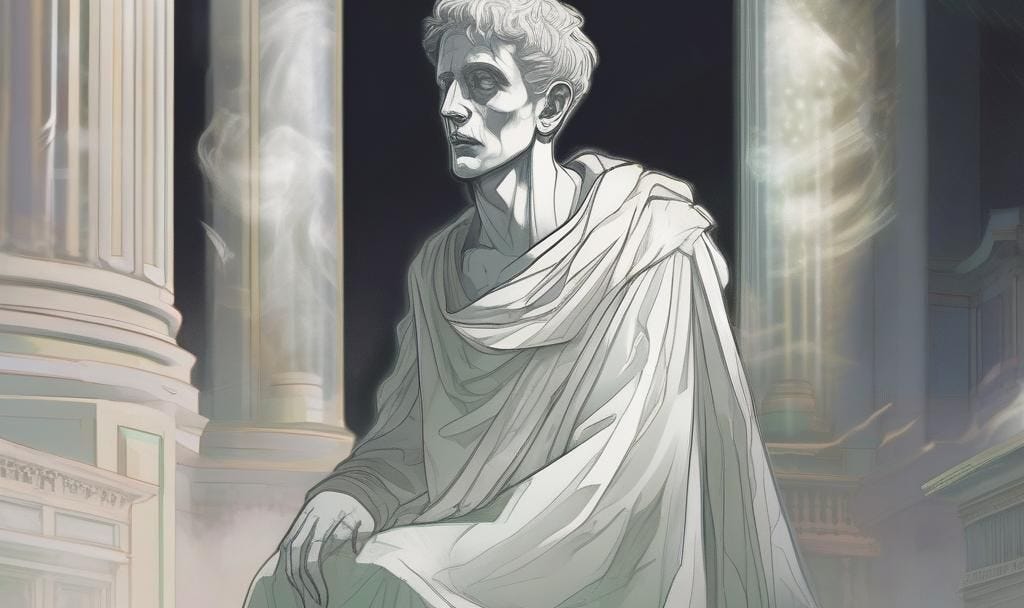I get the strangest feeling reading the fathers of Christian church talk about the first century of the Roman empire without ever mentioning Julius Caesar. They talk about Augustus, Tiberius, Caligula, and Claudius, but the man who was deified by the Senate after conquering Gallia and being assassinated by his own followers hardly merits a mention. Even in the works of Eusebius, who wrote almost 400 years after the dawn of the Roman empire and openly proclaimed himself a historian, Julius Caesar is almost completely absent, as Augustus is given all his glory.
It’s not just the Christians either; the Jewish Philo can’t say anything about Julius Caesar even as he praises Augustus’ exploits. And then there is Josephus, who only mentions the “great” Caesar once in his War of the Jews, in a way that suggests it was pasted there by somebody else. Augustus, according to official history, also took the name of Gaius Julius Caesar before he became emperor, so maybe they were actually the same person, and the famous assassination in 44 BC never happened at all.
Josephus diverges dramatically from Philo (and official history) in the length he gives for Augustus’ reign. Josephus says 57 years and Philo says 43. In fact Josephus apparently counts Augustus’ reign from the death of Julius Caesar or shortly thereafter. Josephus wrote less than a century after Philo and used him as a source. So why on Earth do Josephus and Philo disagree with each other by 14 years? And why is Julius Caesar nowhere to be found in Philo and the Christian church fathers?
One concrete thing we can observe about Josephus is that he tweaks the reigns of Augustus and his successor Tiberius so that they become 13 years and 364 days longer than the combined reigns given by Philo. This could be evidence that Josephus (or whoever stuck Julius Caesar into War) was interested in constructing a Calippic cycle, a tool used for synchronizing the lunar and solar calendars that Dionysius Exiguus later incorporated into the Anno Domini chronology. The Calippic cycle consists of 75 years and 364 days. Incredibly enough, it appears that Eusebius also built a Calippic cycle into the history of Christianity, because he calculates the death of Jesus at 76 years after the beginning of Augustus’ reign.
Let’s examine how Julius Caesar shows up in War of the Jews, because it is at least as suspicious as the way that Jesus Christ shows up in Antiquities. Josephus writes:
“There, was at this time a mighty war raised among the Romans upon the sudden and treacherous slaughter of Caesar by Cassius and Brutus, after he had held the government for three years and seven months. Upon this murder there were very great agitations, and the great men were mightily at difference one with another…
“Upon the war between Cassius and Brutus on one side, against the younger Caesar and Antony on the other, Cassius and Marcus got together an army out of Syria; and because Herod was likely to have a great share in providing necessaries, they then made him procurator of all Syria.”
-Josephus, War of the Jews 1:11:1-4
Thus Josephus only mention Julius Caesar once, without even calling him Julius. Then he mentions the younger Caesar, who from then on, he calls Caesar. How can it be that Josephus only mentions Julius Caesar once in War? He mentions his rival Pompey 45 times! He names Augustus several times. He even mentions the assassination of “Sextus Caesar”. But there is no Julius to be found.
Equally suspicious, there is yet another assassinated Caesar in War, and like Augustus, he was supposedly named after Gaius Julius. This was Caligula, who had supposedly menaced the Jews in Jerusalem by demanding they worship him as a god, installing a massive statue of himself in the Jewish temple, provoking Philo to whisper about the death sentence. Josephus says Gaius (Caligula) “had reigned three years and eight months, and had been slain by treachery”. Compare this to [Julius] Caesar who was killed “after he had held the government for three years and seven months”. Julius Caesar is twins with Caligula in War of the Jews; it’s almost as if someone was trying to create temporal symmetry between BC and AD. It’s another one of those compelling coincidences like Julius Caesar’s birth year falling 100 years before Christ.
If we assume Philo’s dates are legitimate and Josephus or his interpolator has altered them, then Augustus reigned for 43 years. This dating still works with Christian chronology because the Christians state that Jesus was born in the 41st or 42nd year of the reign of Augustus. So far, so good, but the second point of Christian chronology is that Jesus was baptized in the 15th year of Tiberius. Thus by Philo’s chronology, Jesus would have only been 16 or 17 years old when he started preaching.
Eusebius insists, based on the tenures of the high priests Annas and Caiaphas, that Jesus could have only preached for less than four years, dying at the age of 33. But the last year of Annas’ priesthood, which Eusebius argues was the first year of Jesus’s ministry, dates to 15 AD, and the first year of Caiaphas dates to 18 AD, the implied year of Christ’s death. This proves that Eusebius was fiddling with dates, because his argument about Annas and Caiaphas falls too early on the official timeline.
Eusebius used Josephus’ regnal lengths and not Philo’s; by Philo’s chronology, according to Eusebius, Jesus would have died at age 20! Yet church father Irenaeus, based on text from the gospel of John, insists Jesus was older than 40 when he died. Eusebius could be simply wrong about the length of Jesus’ ministry, because Caiaphas remained high priest until 36 AD. Thus, Eusebius could be right about Jesus’ age at death being 33; he has added 14 years to the reign of Augustus in line with Josephus’ chronology but he has subtracted the same amount from Christ’s ministry. Incidentally, Christ’s ministry in Eusebius becomes the same as the lengths of both Julius Caesar’s and Caligula’s reigns in Josephus: less than 4 years.
The remaining conclusion is that all these chronologies are reflecting a real event. I am confident that the event was not a miraculous resurrection but it could be the assassination of Caligula. We already suspect Eusebius of inventing the Flavian Testimony for Antiquities since he was the first person to ever cite it. That makes Eusebius suspect #1 for the interpolation of Josephus with content about [Julius] Caesar and the alteration of Philo’s dates (which can be found in Embassy to Gaius). It seems that Eusebius shortened the ministry and or life of Jesus by 14 years, even as he lengthened the reign of Augustus by the same amount. He did this in order to relate the dawn of the Roman empire to the death of Christ by a Calippic cycle.
I believe that Augustus’ reign may have been lengthened so that Caligula’s life in turn could be shortened. If Caligula should have lived for almost 14 years longer, he would have been about 43 when he died. As I say in my second link below, maybe we should be using the birth year of Christ and the death year of Caligula to talk about the same person. Caligula’s memory was damned and they could very well have erased it.
Read more:
How Eusebius Related Jesus Christ to Augustus Caesar Using a Calippic Cycle
One of Christianity’s biggest mysteries is Irenaeus’ insistence, based on the gospel of John, that Jesus was almost 50 years old when he died. The gospel says “‘You are not yet fifty years old,’ they said to [Jesus], ‘and you have seen Abraham!’” (John 8:56). But church historian Eusebius flatly contradicts this, precisely accounting the number of years…
Caligula: Ghost of Christ and the Caesars
If we really want to understand the chronology of Christianity, we cannot begin with Paul, whose avowed foolishness and nonsense divorces itself from both wisdom and history. All the dating of Christianity and the origins of both Christ and Caesar can be traced to Philo, Marcion, and Irenaeus, with Josephus who throws a Julius shaped wrench into all of …







I hold no position in opposition to your thesis. Antiquity is fragmented. Pre-Constantine I believe there is no monumental architecture for Jesus. No cult. Thus the existence pre-Constantine is quite likely a "just so" story. Julius on the other hand requires some discussion of fraud. Why the need wholesale to invent not only his life, but his books and mint coins and have statues? How does this story benefit the man who became Augustus? https://www.romanemperors.com/blog/unearthing-history-julius-caesars-artifacts-and-their-significance